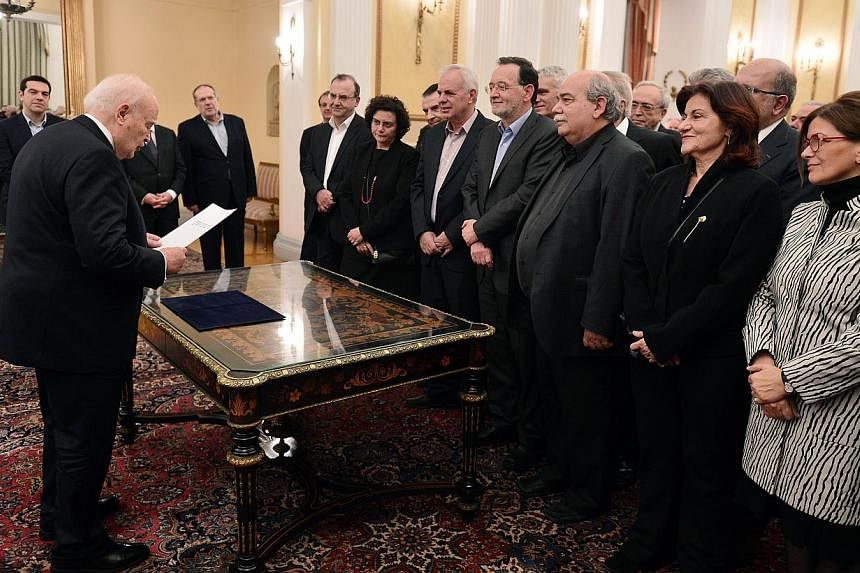ATHENS (REUTERS) - Greek Prime Minister Alexis Tsipras named a Cabinet of anti-austerity veterans and halted privatisation of Greece's biggest port on Tuesday, signalling he aims to stick to election pledges despite warning shots from the euro zone and financial markets.
Greek markets endured a second day of turmoil, with bank shares diving and investors fearing the anti-bailout government might be set on a collision course with the country's European Union and International Monetary Fund creditors.
Promising to reverse Budget cuts and renegotiate Greece's huge debts, Mr Tsipras' leftist Syriza party stormed to power in Sunday's snap election on a wave of anger against the German-backed austerity policies that have driven up poverty and left one in four Greek workers out of a job.
Among a team spanning the radical and more pragmatic wings of Syriza, Mr Tsipras named academic economist Yanis Varoufakis as his finance minister. The defence portfolio went to Mr Panos Kammenos, leader of the right-wing Independent Greeks party which is the junior partner in the Tsipras coalition.
One of the first decisions announced by the new government was stopping the planned sale of a 67 per cent stake in the Piraeus Port Authority, agreed under its international bailout deal for which China's Cosco Group and four other suitors had been shortlisted.
"The Cosco deal will be reviewed to the benefit of the Greek people," Mr Thodoris Dritsas, the deputy minister in charge of the shipping portfolio, told Reuters.
Syriza had announced before the election it would halt the sale of state assets, a plank of the €240 billion (S$365.5 billion) bailout agreement. Stakes in the port of Thessaloniki, the country's second biggest, along with railway operator Trainose and rolling stock operator Rosco are also slated to be sold.
In a separate step, the deputy minister in charge of administrative reform George Katrougkalos said the government would reverse some layoffs of public sector workers, rolling back another key bailout measure. "It will be one of the first pieces of legislation that I will bring in as a minister," he told Mega TV.
Mr Varoufakis has railed against the bailouts of struggling euro zone states as "fiscal waterboarding".
But after being sworn in, he said the government would be constructive. "We are about to begin negotiating with our partners," he told reporters. "It is a great challenge, but the challenge is how to minimise social costs that were unnecessary throughout Europe," he said.
The first meeting of the new Cabinet is expected at 10.30am, but already the scale of the challenges it faces were starting to become apparent.
On the financial markets, yields on Greek three-year bonds jumped above 14 per cent. This was up four percentage points since Sunday's vote although down from 16 per cent at the beginning of the year, before the European Central Bank announced plans to stimulate the euro zone economy by buying debt issued by the bloc's governments.
A dive in banking stocks pushed the Athens bourse down by 3.69 per cent. Investors are worried about Greek banks' liquidity and whether they will have continued access to ECB funding, with an extension to the country's bailout deal with the euro zone due to expire at the end of this month.
A German central banker warned of dire problems should the new government call the country's aid programme into question, jeopardising funding for the banks. "That would have fatal consequences for Greece's financial system. Greek banks would then lose their access to central bank money," Bundesbank board member Joachim Nagel told Handelsblatt newspaper.
Moody's credit rating agency said uncertainty created by the Syriza victory is negative for Greece's credit rating, adding that it "undermines depositor confidence and has an adverse effect on economic growth prospects".
The government's plan to negotiate a new debt deal has already run into resistance from its euro zone peers, which fear allowing Athens to write off some of its obligations would encourage other troubled countries to seek similar relief.
Europe has shown a willingness to give Athens more time to pay its debts, but has stressed it will not yield to the demands for debt forgiveness.
On Monday the head of the Eurogroup of euro zone finance ministers, Mr Jeroen Dijsselbloem, warned Greeks against excessive expectations following their emphatic vote against austerity.
"We all have to realise and the Greek people have to realise that the major problems in the Greek economy have not disappeared and haven't even changed overnight because of the simple fact that an election took place," he said.
The new Cabinet includes a number of lawyers, professors and some former journalists. Former Communist politician Yannis Dragasakis - who in the run-up to the vote demanded an investigation into Greece's bailout - took the deputy prime minister's role that is expected to oversee economic issues.
The government, installed within 48 hours of Sunday's win, is expected to pursue social welfare policies such as handing out free electricity and food stamps to the poor and cutting heating oil prices, alongside a crackdown on tax evasion.
On the labour front, Mr Tsipras is expected to reverse a cut to the minimum wage and restore collective bargaining agreements abolished under the bailout deal, as well as instituting a €5 billion plan of incentives for firms to hire workers.
Syriza officials have also promised to take on business tycoons, though in the run-up to the vote they said little about whether they will implement earlier pledges to slap new taxes on big Greek shipowners.
Mr Tsipras has also promised that he will scrap unpopular crisis-era taxes, prompting critics to question how he will be fund planned social spending.

